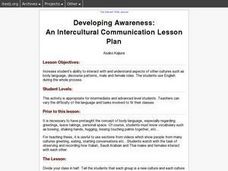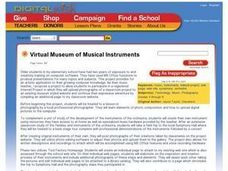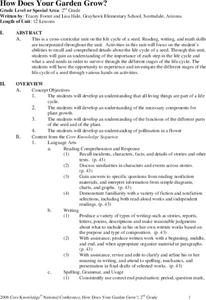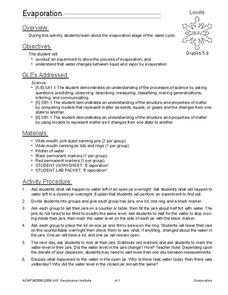Curated OER
What Happens in the First Nine Months?
Students identify their feelings and learn constructive ways of handling conflict. For this conflict lesson students discuss their feelings and when they are feeling a certain way what they can do to remedy the situation.
Curated OER
Science Simulation: BBC Science Simulations 3
Students perform experiments on a Promethean Board and will identify and use stages of the inquiry process. Students will be in instructed in the use of a Promethean board, will practice and eventually perform experiment on their own.
Curated OER
Soggy Seeds
Students conduct experiments to learn about seed germination. In this seed germination lesson, students write a hypothesis for the seed experiment. students complete the experiment for seed germination and graph the data obtained from...
Curated OER
Moral Development: Lawrence Kohlberg
Students study the stages of moral development. In this psychology lesson, students explore Lawrence Kohlberg's stages of moral development as they read, respond to, and evaluate a moral development scenario.
Curated OER
Formation of Fossil Fuels
Young scholars research the origin of oil and natural gas to gather an understanding of the stages of fossil fuel formation. Then the class creates murals depicting the life cycle of a fossil fuel.
Curated OER
Developing Awareness: An Intercultural Communication Lesson Plan
Students, divided into two groups, are put into a new culture, where they must create their own body language for greetings, etc. They learn aspects of other cultures such as body language, discourse patterns, male and female roles.
Curated OER
Getting Familiar with Fractals
Young scholars use the Internet to answer lab questions about fractals, and then construct fractals using the initial stage and iteration rule. They complete tables and generate rules for the "nth" term and create their own fractals.
Curated OER
Life Cycles: A Never-Ending Story
Second graders describe the sequence of events in the life cycles of a butterfly, frog, and a deer. They observe the differences and similarities of parents and babies. They also discover that at different stages the animals can be...
Curated OER
How Alzheimer's Affects the Brain
Pupils study how Alzheimer's affects different parts of the brain, sketch a healthy neuron and its parts, and diagram brain changes during the early and late stages of Alzheimer's.
Curated OER
How Do Cells Reproduce?
Students discuss the importance of reproduction of cells. They identify and describe the stages of Mitosis. They discover what happens to chromosomes and DNA during reproduction.
Curated OER
Life Cycle of the Drosophila Fly
Students observe the life cycle of the Drosophila fly as well as manipulate large numbers of flies, determine the difference between the sexes, and identify the different stages of the fly's life cycle.
Curated OER
Human Development
Students are introduced to the stages of human development. In groups, they research the theories of Erickson, Maslow and Havighurst and compare them to one another. To end the lesson, they present their material to the class and...
Curated OER
The Water Cycle: A Repeating Pattern in Nature
Students are introduced to the terms related to the water cycle in their native language. In groups, they describe the steps of the cycle using different materials found in their art classroom. They describe how energy helps water...
Curated OER
Virtual Museum of Musical Instruments
Young scholars incorporate elements of photo composition and demonstrate how to upload digital pictures to the computer. They create their own instrument utilizing resources from home as well as specialized music hardware. They...
Curated OER
Technology has a Solution!
In this technology worksheet, students summarize four things they learned about technology and the environment. Students then write a report that outlines how technology is solving environmental issues.
Curated OER
Using Microscopes
Learners do an experiment using a microscope. In this lesson, about cells, students examine different slides using a microscope. Learners look at an onion skin, cheek cells, and potato cells. In each of these, students find cell walls,...
Curated OER
How Does Your Garden Grow?
Students complete activities to learn about the life cycle of a seed. In this plant growth lesson, students complete activities for the life cycles of seeds.
Curated OER
Evaporation
Students study the evaporation stage of the water cycle. For this water cycle lesson, students participate in an experiment to study the process of evaporation that uses jars and water. Students complete an observation worksheet for the...
Curated OER
Can the Lords Keep Their Jobs?
Students investigate reform in British Parliament. In this current events lesson, students visit selected websites to learn what the House of Lords is responsible for and determine how their jobs may be changing.
Curated OER
Out and About: The Science of Sport
Young scholars take a closer look at sports science. In this hands-on learning lesson, students may visit the Science Museum, the Life Science Centre, or the Wimbledon Lawn Tennis Museum online or in-person to discover details related to...
Curated OER
Water Cycle Boogie
Learners explore the water cycle. They learn the "Water Cycle Boogie." Students create hats to represent the different parts of the cycle and learn hand motions to go with the words of the song. Learners practice singing the song and the...
Curated OER
Animal Shelters - Sharing Our Knowledge
Students arrange a service project for a local animal shelter. In this animal shelter lesson, students collect items to be given to a local shelter. They learn how to estimate the monetary value of the donated items. They can do optional...
Curated OER
Literacy: Each One Teach One
Students read the book, Amber on the Mountain and discuss its philanthropic implications. They determine the literacy needs of their own communities. They ask family members to complete reading recollection forms about when and how they...
Curated OER
Scaffolding
Our job as teachers is to facilitate learning by providing a comfortable & efficient environment for learning to take place. To enable this we provide 'scaffolding' to support the learner. Without this the building, the learning...

























